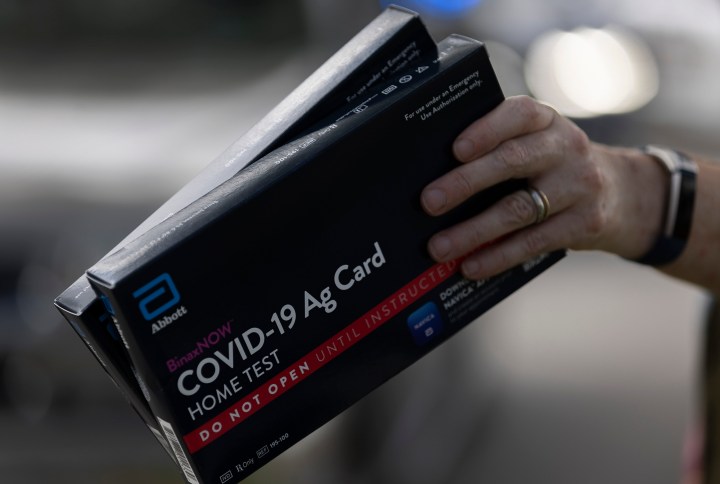
What is the price of a COVID-19 test now?

With the omicron coronavirus variant spreading across the country, the White House has said it will order 1 billion at-home COVID-19 tests to distribute to Americans — free of charge.
President Joe Biden announced this week that his administration plans to order an additional 500 million tests on top of the 500 million it said it would purchase. He said the government will launch a website next week where Americans can request these tests.
The highly contagious virus is threatening to upend the economy and business operations just as the recovery was gaining steam. Some employers that were banking on in-person work in the new year have altered course, while many universities and businesses have opted to shut down in response.
Access to testing has become scarce in some areas, with people reporting long wait times in line and retailers running out of stock. In response, prices have fluctuated and some resellers have taken advantage of the shortages.
The unpredictability of test pricing
Walmart and Kroger raised prices for their Abbott BinaxNOW rapid tests following the end of a deal they made with the White House. The two companies agreed to sell tests “at cost” for 100 days, resulting in a 35% discount to normal pricing. Walmart, which kept the price discounted past the initial agreement and into the holidays, raised the price of its BinaxNOW kit from $14 to almost $20. Kroger increased it from $14 to about $24.
Meanwhile, a set of two COVID-19 tests from Abbott or QuickVue sells for almost $24 at CVS and Walgreens.
Test shortages have led resellers to hike up the price, prompting some state officials to take action.
In California, Gov. Gavin Newsom signed an executive order to prevent price gouging, barring sellers from increasing the product’s previous price by more than 10%. Meanwhile, New York Attorney General Letitia James called on residents to report any instance of gouging after receiving complaints that COVID testing products were being sold at two to three times the retail price.
Georgia’s attorney general and public health commissioner also warned state residents about testing scams and price gouging. Officials are “aware of reports of overcharging for COVID-19 tests,” the attorney general’s consumer protection division said.
The cost of getting a test at a hospital has also been inconsistent, with a 2021 analysis from the Kaiser Family Foundation showing that prices can range between $20 and $1,419 for a single test. Even though Congress passed a law mandating free COVID-19 testing that prohibits copays and deductibles, the KFF explained that patients may receive bills anyway because out-of-network providers don’t have to bill insurance directly for these tests and federal requirements don’t apply to certain private plans, among other reasons.
Who will benefit from Biden’s reimbursement plan?
The White House also said this week that health insurers will have to cover the cost of at-home COVID tests beginning Saturday. In a press release, the administration noted this means those who buy a test will have it paid upfront by their health plan or be reimbursed after submitting a claim.
People who have private health insurance or are covered under a group plan will get up to eight free over-the-counter tests a month, while there is no limit if they’ve been ordered or administered by a health care provider after a clinical assessment.
However, there are limitations to this plan. Monica Wang, an associate professor of community health sciences at Boston University, said these eight tests a month will help a segment of the U.S. population, but they don’t address the needs of those who have public insurance or are uninsured or underinsured.
“These populations are also likely to be sensitive to the cost of tests because these typically include people who are eligible for Medicaid and Medicare or who have low income,” she explained.
Front-line workers — those who have risky in-person jobs and would benefit from testing — are disproportionately less likely to have health insurance, according to a 2020 analysis from Public Citizen. The uninsured rate for agricultural workers is more than 50%, 27% for cooks, 26% for home care workers and 16% for meatpacking workers. That’s compared to a national average of 9%.
Dr. Utibe Essien, an assistant professor of medicine at the University of Pittsburgh, is concerned about possible logistical hurdles the plan poses.
“I think we probably all have experienced the long phone calls and dealing with insurance, trying to figure out why we have that copayment price be the price that it was,” Essien said.
Like Wang, he pointed out that the plan will “unfortunately” not benefit uninsured people, who are largely from low-income racial and ethnic minority groups. But he does expect it to help with the overall supply-and-demand equation for COVID tests.
Essien said patients must be tested to demonstrate that they qualify for some of the newer therapies, like antivirals and monoclonal antibodies.
“I think unless we have equitable access to testing, that we’re not going to see equity in treatment,” he said.
Wang said offering more mobile testing sites and increasing the supply of at-home kits are critical.
“These are all foreseeable increases in demand that we could have planned for in advance,” Wang said. “So knowing that the winter season and the flu season is upon us, knowing that people are traveling during the holidays, this is the exact time to plan in advance to have more than enough tests available.”
There’s a lot happening in the world. Through it all, Marketplace is here for you.
You rely on Marketplace to break down the world’s events and tell you how it affects you in a fact-based, approachable way. We rely on your financial support to keep making that possible.
Your donation today powers the independent journalism that you rely on. For just $5/month, you can help sustain Marketplace so we can keep reporting on the things that matter to you.


















